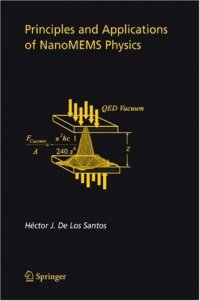
Ebook: Principles and Applications of NanoMEMS Physics
Author: Héctor J. De Los Santos (auth.)
- Genre: Technique // Instrument
- Tags: Nanotechnology, Optical and Electronic Materials, Electronic and Computer Engineering, Laser Technology and Physics Photonics, Quantum Optics Quantum Electronics Nonlinear Optics
- Series: Microsystems 15
- Year: 2005
- Publisher: Springer US
- City: Dordrecht, The Netherlands
- Edition: 1
- Language: English
- pdf
Principles and Applications of NanoMEMS Physics presents the first unified exposition of the physical principles at the heart of NanoMEMS-based devices and applications. In particular, after beginning with a comprehensive presentation of the fundamentals and limitations of nanotechnology and MEMS fabrication techniques, the book addresses the physics germane to this dimensional regime, namely, quantum wave-particle phenomena, including, the manifestation of charge discreteness, quantized electrostatic actuation, and the Casimir effect, and quantum wave phenomena, including, quantized electrical conductance, quantum interference, Luttinger liquids, quantum entanglement, superconductivity and cavity quantum electrodynamics. Potential building blocks are also addressed for NanoMEMS applications, including, nanoelectromechanical quantum circuits and systems such as charge detectors, the which-path electron interferometer, and the Casimir oscillator, as well as a number of quantum computing implementation paradigms. Finally, NanoMEMS applications in photonics are addressed, including nanophotonic light sources and plasmonic devices.
The field of Nanotechnology, which aims at exploiting advances in the fabrication and controlled manipulation of nanoscale objects, is attracting worldwide attention. This attention is predicated upon the fact that obtaining early supremacy in this field of miniaturization may well be the key to dominating the world economy of the 21st century, and beyond. NanoMEMS exploits the convergence between nanotechnology and microelectromechanical systems (MEMS) brought about by advances in the ability to fabricate nanometer-scale electronic and mechanical device structures. In this context, NanoMEMS-based applications will be predicated upon a multitude of physical phenomena, e.g., electrical, optical, mechanical, magnetic, fluidic, quantum effects and mixed domain.
Principles and Applications of NanoMEMS Physics presents the first unified exposition of the physical principles at the heart of NanoMEMS-based devices and applications. In particular, after beginning with a comprehensive presentation of the fundamentals and limitations of nanotechnology and MEMS fabrication techniques, the book addresses the physics germane to this dimensional regime, namely, quantum wave-particle phenomena, including, the manifestation of charge discreteness, quantized electrostatic actuation, and the Casimir effect, and quantum wave phenomena, including, quantized electrical conductance, quantum interference, Luttinger liquids, quantum entanglement, superconductivity and cavity quantum electrodynamics. Potential building blocks are also addressed for NanoMEMS applications, including, nanoelectromechanical quantum circuits and systems such as charge detectors, the which-path electron interferometer, and the Casimir oscillator, as well as a number of quantum computing implementation paradigms. Finally, NanoMEMS applications in photonics are addressed, including nanophotonic light sources and plasmonic devices.